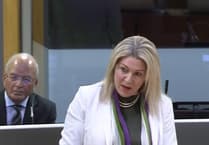Welsh Government is to pledge an extra £32 million for tree planting as part of its journey to making Wales net zero by 2050.
Minister Julie James announced last week the money will be provided for farmers and landowners to help plant 86 million trees by the end of the decade to combat the climate emergency.
However the Country Land & Business Assocition (CLA) Cymru said the government needs to adopt an holistic approach to net zero, food security and other rural goals.
The £32m pledge follows a short, intensive review carried out by the deputy minister for climate change which looked at removing barriers to woodland creation.
In order to reach their target of making the country net zero by 2050, Wales needs to plant 43,000 hectares of new woodland by the end of this decade.
As part of this intended target, two new schemes have been set up to meet the target.
The Small Grants Woodland Creation scheme, will simplify funding for farmers and other land managers to plant small areas of trees on land in Wales while The Woodland Creation Grant, will offer funding for tree planting and fencing to farmers and land managers who have a woodland creation plan, approved by the Welsh government. Both schemes will provide grants towards tree planting, fencing and gates and 12 years of maintenance support.
Minister for climate change Julie James said: “Planting more trees will play a fundamental role in helping Wales to avoid some of the worst effects of climate change. Woodland creation can also provide a wealth of benefits to local communities from green jobs to places for nature.
“We want farmers in Wales to be central to our plans. They know their land better than anybody else so, to ensure the sustainability of their business, we will leave decisions around where trees should be planted entirely with them. As long as they meet the UK Forestry Standard, we are on hand to offer the support they may need.”
Ceri Davies, executive director of evidence, policy and permitting at Natural Resources Wales, said: “Increasing the tree canopy across Wales as part of the Woodland Creation Scheme is a crucial part of the effort to tackle the climate and nature emergencies and to help achieve the nation’s net zero ambitions.’’
While welcome more support for tree planting CLA Cymru’s Nigel Hollett said: “Wales needs a plan which brings together all our priorities in food production, managing climate change, biodiversity and supporting our rural communities.
“I welcome the Welsh government’s investment of £32 million in tree planting, but it’s time to set aside the silo-thinking about tree planting and food production: they should not be alternatives but part of an integrated range of mutually supportive measures which meet society’s goals.
“Farmers and landowners are committed to play their part in meeting net-zero. Government’s challenge is to harness the countryside’s unique capacity to manage carbon as part of a rural powerhouse to produce food and sustain dynamic rural communities.
“In meeting net zero goals the Welsh Government needs to focus on the wider gamut of plant life. We know crops, grassland, hedges and field margins, peatland and our aquatic plant life all can play their part. Many can manage carbon more quickly and efficiently that newly-planted trees.
“Improving food security and quality of our food are going to be critical topics of debate when the Agriculture (Wales) Bill is introduced this autumn. Our Sustainable Farming Scheme should rightly reward farmers for both growing the healthy food we need and reward them for their work in managing carbon.
“There’s still work to be done to improve Wales woodland and trees strategy. The CLA has long called for a national strategy on tree health to protect the life of existing trees. We must put a stop to the leaky-bucket effect of investing in more trees when many are succumbing to disease and damage.”
“A more effective tree planting policy will include further care into planting the right trees in the right place, planting-density, range of varieties and companion-planting. Saplings are vulnerable: those who plant new trees need further support to maintain them and monitor progress.”
Nigel Hollett concludes, “When the Sustainable Farming Scheme becomes established it is inevitable that the Government’s policy priorities and the resources available will drive this more holistic approach to rural land management.”





Comments
This article has no comments yet. Be the first to leave a comment.